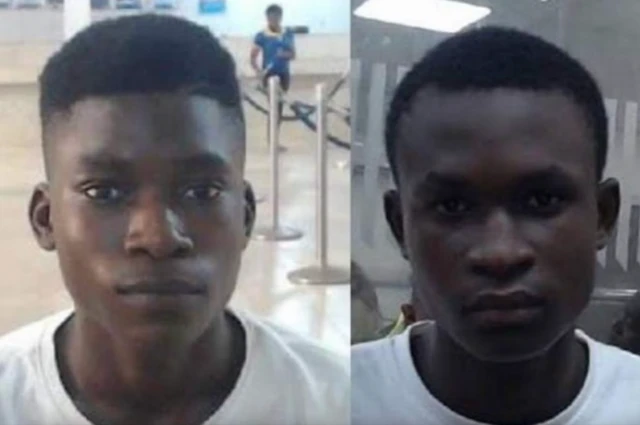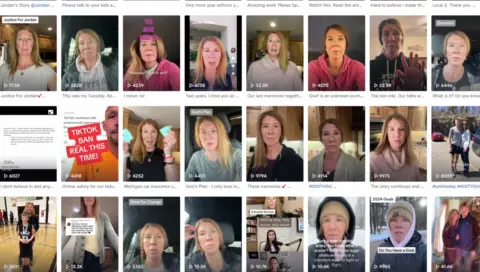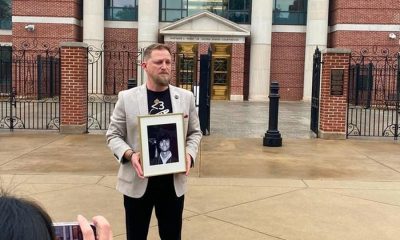metro
Mother narrates how her son was dead in six hours after Nigerian sextortion scammers hit him

Mother narrates how her son was dead in six hours after Nigerian sextortion scammers hit him
Sextortion is the fastest-growing scam affecting teenagers globally and has been linked to more than 27 suicides in the US alone. Many of the scammers appear to be from Nigeria – where authorities are defending their actions and are under pressure to do more.
It has been two years since Jenn Buta’s son Jordan killed himself after being targeted by scammers who lured him into sending them explicit images of himself, and then tried to blackmail him.
She still can’t bring herself to change anything about his bedroom.
The 17-year-old’s basketball jerseys, clothes, posters and bedsheets are just how he left them.
The curtains are closed, and the door is shut to keep memories of him that only a parent would understand.
“It still smells like him. That’s one of the reasons I still have the door closed. I can still smell that sweat, dirt, cologne mix in this room. I’m just not ready to part with his stuff,” she said.
Jordan was contacted by sextortion scammers on Instagram.
They pretended to be a pretty girl his age and flirted with him, sending sexual pictures to coax him into sharing explicit photos of himself.
They then blackmailed him for hundreds of pounds to stop them sharing the pictures online to his friends.

Samuel, 22, and Samson Ogoshi, 20, arrested in Lagos, are awaiting sentencing in the US
Jordan sent as much money as he could and warned the sextortionists he would kill himself if they spread the images. The criminals replied: “Good… Do that fast – or I’ll make you do it.”
It was less than six hours from the time Jordan started communicating until the time he ultimately took his life.
READ ALSO:
- Soldiers killings: Aba under lockdown as reprisal, arrests continue
- Gaza: Israel massacres 210, Palestine demands emergency UN session
- Resign if you can’t pay minimum wage, labour tells govs
“There’s actually a script online,” Jenn told BBC News, from her home in Michigan, in the north of the US. “And these people are just going through the script and putting that pressure on.
“And they’re doing it quick, because then they can move on to the next person, because it’s about volume.”
The criminals were tracked to Nigeria, arrested, and then extradited to the US.
Two brothers from Lagos – Samuel Ogoshi, 22, and Samson Ogoshi, 20 – are awaiting sentencing after pleading guilty to child sexploitation charges. Another Nigerian man linked to Jordan’s death and other cases is fighting extradition.

Jordan’s mother, Jenn, has posted dozens of videos to raise awareness
Jordan’s tragic story has become a touch point in the fight against the growing problem of sextortion.
Jenn is a now high-profile campaigner on TikTok – using the account Jordan set up for her – to raise awareness about the dangers of sextortion to young people. Her videos have been liked more than a million times.
It’s feared that sextortion is under-reported due to its sensitive nature. But US crime figures show cases more than doubled last year, rising to 26,700, with at least 27 boys having killed themselves in the past two years.
Researchers and law enforcement agencies point to West Africa, and particularly Nigeria, as a hotspot for where attackers are based.
In April, two Nigerian men were arrested after a schoolboy from Australia killed himself. Two other men are on trial in Lagos, after the suicides of a 15-year-old boy in the US and a 14-year-old in Canada.
In January, US cyber-company Network Contagion Research Institute (NCRI) highlighted a web of Nigerian TikTok, YouTube and Scribd accounts sharing tips and scripts for sextortion. Many of the discussions and videos are in Nigerian Pidgin dialect.
It’s not the first time that Nigeria’s young tech-savvy population has embraced a new wave of cyber-crime.
The term Yahoo Boys is used to describe a portion of the population that use cyber-crime to earn a living. It comes from the early 2000s wave of Nigerian Prince scam emails which spread through the Yahoo email service.
Dr Tombari Sibe, from Digital Footprints Nigeria, says cyber-fraud such as sextortion has become normalised to young people in the country: “There’s also the big problem of unemployment and of poverty.
“All these young ones who don’t really have much – it’s become almost like a mainstream activity where they don’t really think too much about the consequences. They just see their colleagues making money.”
READ ALSO:
- EFCC raids two night clubs in Ondo, arrests 127 suspected fraudsters
- Implement anti-open grazing law, Women group tells S’East govs
- Two killed in southern Lebanon as Hezbollah-Israel fighting soars
African human rights charity Devatop has said the current methods of handling sextortion in Nigeria have failed to effectively curb the practice. And a report from NCRI said that celebrating sextortion crimes are an established part of the internet subculture in the country.
In an exclusive interview with the BBC, the director of Nigeria’s National Cyber Crime Centre (NCCC) defended his police force’s actions, and insisted it was working hard to catch criminals and deter others from carrying out attacks.
Uche Ifeanyi Henry said his officers were “hitting criminals hard” and said it is “laughable” that anyone should accuse Nigeria of not taking sextortion crime seriously.

Sextortion criminals are not only from Nigeria, Cyber Crime Centre director Uche Ifeanyi Henry says
“We are giving criminals a very serious hit. A lot have been prosecuted and a lot have been arrested,” he said. “Many of these criminals are moving to neighbouring countries now because of our activity.”
The NCCC director pointed to the fact that the government has spent millions of pounds on a state-of-the-art cyber-crime centre, to show it was taking cyber-crime seriously, especially sextortion.
He said Nigerian teenagers are also being targeted, and he argued that the criminals were not just a Nigerian problem, with other sextortionists in south-east Asia. Tackling them would require global support, he said.
With that in mind, the director and his technical team are this week visiting the UK’s National Crime Agency, which last month issued a warning to children and schools about a rise in sextortion cases.
The visit is designed to improve collaboration on sextortion and other cyber-crime investigations. It follows similar recent meetings with Japanese police.
Meanwhile, Jenn Buta continues to campaign alongside Jordan’s father John DeMay. They regularly give advice to young people who may become victims.
Advice that Jenn and many law enforcement agencies regularly give people targeted by sextortionists includes:
- Remember you are not alone and this is not your fault
- Report the predator’s account, via the platform’s safety feature
- Block the predator from contacting you
- Save the profile or messages – they can help law enforcement identify and stop the predator
- Ask for help from a trusted adult or law enforcement before sending money or more images
- Co-operating with the predator rarely stops the blackmail and harassment – but law enforcement can
Mother narrates how her son was dead in six hours after Nigerian sextortion scammers hit him
BBC
metro
TikTok removes 2.4 million videos by Nigerian users in Q4 2024

TikTok removes 2.4 million videos by Nigerian users in Q4 2024
Bytedance’s short video platform, TikTok, said it removed 2.4 million videos posted by Nigerian users in the fourth quarter of 2024 for violating its content policy.
According to the platform, Nigeria was among the top 50 countries where videos violating its policies emanated from in Q4.
However, the highest number of violations were recorded in the United States, which has the largest number of videos removed at 8.5 million.
ikTok disclosed this in its latest Community Guidelines Enforcement report, which indicated that a total of 153 million videos were removed globally in the period under review.
The company said the top 50 markets in terms of policy violations accounted for approximately 90% of all content removals for the quarter.
READ ALSO:
- Two children killed, 20 injured in Gombe stampede – Police
- Wike’s achievements will translate into electoral success for APC in 2027, says Tinubu
- World Bank approves Tinubu’s $632m loan request
The removed content was said to have violated one or more of TikTok’s policies, which center around Integrity and Authenticity, Privacy and Security, Mental and Behavioural Health, Safety, and Civility, among others.
Accounts removal
In the period under review, TikTok said it removed a total of 211.5 million accounts discovered to be either fake or owned by people suspected to be under 13 years of age.
- Fake accounts constituted the largest number of deleted accounts for the period. According to the report, a total of 185.3 million fake accounts were removed.
- In addition, 20.5 million accounts suspected to be owned by users under the age of 13 were removed, while 5.6 million accounts were removed for other reasons not stated.
“We remain vigilant in our efforts to detect external threats and safeguard the platform from fake accounts and engagement.
“These threats persistently probe and attack our systems, leading to occasional fluctuations in the reported metrics within these areas.
“In Q4 2024, we also updated the way we classify fake likes and followers removed over time, which contributed to some of the overall increases observed in these categories.
“This update better reflects the scale of our existing work to promptly identify and remove any accounts, content, or activities that seek to artificially boost popularity on our platform,” the company stated in the report.
TikTok removes 2.4 million videos by Nigerian users in Q4 2024
metro
Two children killed, 20 injured in Gombe stampede – Police

Two children killed, 20 injured in Gombe stampede – Police
The Police Force Gombe State Command has confirmed the death of two children following a stampede at the Gombe main Eid Ground.
The Command’s spokesperson, Buhari Abdullahi, disclosed this in a statement issued on Sunday in Gombe.
According to Abdullahi, the incident occurred at about 10:45 a.m. at the exit gate of the Eid Ground, immediately after the conclusion of Eid prayers.
“The stampede was caused by inadequate exit access, as a large crowd, primarily women and children, rushed to leave the venue.
“The situation, worsened by intense heat, led to the unfortunate incident,” he said.
He said that 22 individuals were affected and were immediately taken to hospitals for medical attention.
“Regrettably, two of the victims, a four-year-old boy, and six months old baby girl, were pronounced dead by doctors while receiving treatment,” Abdullahi added.
READ ALSO:
- Wike’s achievements will translate into electoral success for APC in 2027, says Tinubu
- World Bank approves Tinubu’s $632m loan request
- Okada rider allegedly stabbed to death by wife over money
He extended the command’s condolences to the bereaved families and wished the injured a speedy recovery.
“The police urge Eid Ground managers to ensure that all entrance and exit gates remain open to facilitate smooth movement, especially after prayers,” he advised.
In a related development, Gov. Inuwa Yahaya of Gombe State has condoled with the families of the deceased and those affected by the tragedy.
In a statement issued by his media aide on Sunday, the governor directed a thorough investigation into the circumstances that led to the stampede, with the aim of preventing future occurrences.
“The safety and well-being of our citizens remain a top priority. The state government is committed to learning from this incident and implementing corrective measures,” Yahaya said.
He also directed that all medical expenses for the injured victims be fully covered by the state government to ensure their recovery and well-being.
Two children killed, 20 injured in Gombe stampede – Police
(NAN)
metro
Wike’s achievements will translate into electoral success for APC in 2027, says Tinubu

Wike’s achievements will translate into electoral success for APC in 2027, says Tinubu
President Bola Tinubu has praised the Minister of the Federal Capital Territory (FCT), Nyesom Wike, for his outstanding performance, expressing confidence that his achievements could translate into electoral success for the All Progressives Congress (APC) in the 2027 FCT elections—despite Wike still being a member of the Peoples Democratic Party (PDP).
Tinubu made the remarks at the State House, Abuja, on Sunday during a traditional Sallah homage by a delegation of prominent FCT residents to mark Eid-el-Fitr celebrations.
The President commended Wike’s leadership, noting that several infrastructure projects initiated under his administration, have significantly improved the lives of Abuja residents.
“I must thank the Honorable Minister of FCT. It’s worth it. It is nothing other than a privilege to be the landlord of every one of us in Abuja,” Tinubu said.
READ ALSO:
- World Bank approves Tinubu’s $632m loan request
- Okada rider allegedly stabbed to death by wife over money
- Police rescue two persons abducted in Lagos
He recalled a conversation where Wike requested exemption from the Treasury Single Account (TSA) to enable greater financial flexibility for FCT projects.
Tinubu humorously recounted his response:”I asked him, ‘Would that give me an opportunity for my party (APC) to win the election in FCT?’ If this thing goes too much in your favour, you will lose your job!’”
“Today, we are living in peace, and security is improving. The hunger is coming down. Food prices are lowering. Our people are looking for results, and Wike has delivered,” Tinubu added.
Tinubu noted that despite being from the South-South, Wike is successfully driving progress in the Northern-dominated FCT.
“Surprisingly, Nyesom Wike is not from the North. He’s not a Hausa man. Yet his ability to work in the centre of the North is yielding fruits. That is a great reflection of our diversity that we must use for prosperity.”
The President urged Nigerians to embrace unity, stating that, regardless of ethnic and religious differences, progress is only possible through collaboration and shared purpose.
Wike’s achievements will translate into electoral success for APC in 2027, says Tinubu
-

 Uncategorized2 days ago
Uncategorized2 days agoBreaking: Moon sighted in Saudi, UAE, others, Eid-Fitr holds Sunday
-

 metro2 days ago
metro2 days agoRamadan ends in Nigeria, Sultan announces March 30 as Eid-el-Fitr
-

 metro2 days ago
metro2 days agoFubara reacts as Ex-HOS, Nwaeke accuses him of bombing oil pipelines, Rivers Assembly
-

 metro2 days ago
metro2 days agoEmbrace environmental sanitation during Eid-Fitr, LAGESC boss tells Lagosians
-

 Opinion2 days ago
Opinion2 days agoBarbaric mass burning of innocents in Edo, by Farooq Kperogi
-

 metro2 days ago
metro2 days agoEx-Rivers HoS wife cries for help over husband’s safety
-

 metro2 days ago
metro2 days agoNatasha: Emmanuel Uduaghan threatens to sue Senator Nwaebonyi
-

 Business2 days ago
Business2 days agoElon Musk sells X to AI startup for $33 billion









